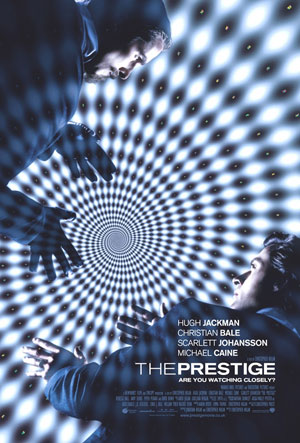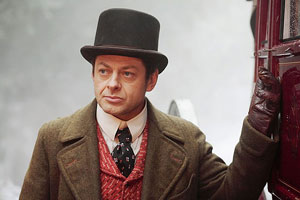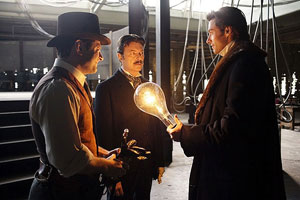 He’s been a mutated hobbit. He’s been a giant, angry and lovelorn ape. And now he’s the assistant to the man who may have been the greatest scientific genius in history. In The Prestige Andy Serkis gets out from behind the pixels and plays a flesh and blood character: Mr. Alley, the man you have to see if you want to get near Nicola Tesla, played by rock legend David Bowie. That makes him an important character in the film, since Hugh Jackman’s Robert Angier is desperate to get Tesla to build him a machine that will give him the greatest magic act of all time.
He’s been a mutated hobbit. He’s been a giant, angry and lovelorn ape. And now he’s the assistant to the man who may have been the greatest scientific genius in history. In The Prestige Andy Serkis gets out from behind the pixels and plays a flesh and blood character: Mr. Alley, the man you have to see if you want to get near Nicola Tesla, played by rock legend David Bowie. That makes him an important character in the film, since Hugh Jackman’s Robert Angier is desperate to get Tesla to build him a machine that will give him the greatest magic act of all time.
Yes, The Prestige is the other 19th century magician movie. This time it’s Hugh Jackman and Christian Bale as the deadliest of illusionist enemies who stop at nothing to trump each other on stage and in life. Based on Christopher Priest’s novel, The Prestige is the movie that Christopher Nolan took on in his downtime between Batman films.
When I talked to Andy Serkis on the phone a week back, neither of us had seen the film yet. I saw it last night, and I hope Andy has had a chance to as well, because he’s pretty great as Mr. Alley. While it’s nice to see his real face in one of his movies for once, Serkis hasn’t left digital performance behind; in the course of this interview we talk about the future of the form and what he’s been doing in it, as well as a very topical live action film he has coming up.
The Prestige opens everywhere this weekend.
What’s it like working with David Bowie? Is it intimidating?
Serkis: Not in the slightest. He’s the most unassuming, gentle, funny guy. He’s really lovely. We had a blast, and I really enjoyed working with him. We had quite a few laughs on the set.
Why do you think we have these two 19th century magician movies coming out at about the same time?
Serkis: It seems to me that whenever you make your movie there’s always another movie that’s trying to say something similar. It happens on a number of occasions. I haven’t seen The Illusionist, but I hear it’s an amazing film and the performances and terrific. I don’t know what the story is; ours deals with illusion and reality amongst many other things. I think there’s something that seems to be current at the moment about the amount of information we receive. In our lives we receive so much reality but what we really seek is the magic, is the otherness, is the gap between reality and fantasy. Illusion is a way to it. When I read the script it tapped into that for me, that we want to be fooled. When watching magic the audience knows they’re being conned, but they enjoy the process of being conned and not knowing how it’s done. Nowadays in most forms of entertainment it’s upfront and explained how it’s done; we have making of DVDs. The magic is removed, really.
 A lot of young men flirt with learning magic or card tricks while growing up. Have you picked up any tricks in your life?
A lot of young men flirt with learning magic or card tricks while growing up. Have you picked up any tricks in your life?
Serkis: I’ve learned one very simple trick which I impress my children with – actually, they’re not impressed by it at all. You take a match and you break it off and you stick it between your thumb and forefinger and you flick it and it seems to disappear. It only works from about one angle and if you’re about fifty yards away from everybody else!
You have a new film coming out which sounds very interesting, Rendition.
Serkis: You know about that!
It sounds so topical and current. You’re talking about magic and illusion, and I think people know you from these fantastical roles, but in Rendition you’re playing a much less fantastical role.
Serkis: Absolutely. I’m playing a Jordanese interrogator. It was an amazing filming experience, actually, because the whole film was improvised. [It’s about] this unfortunate man who is just whisked away off the street and doesn’t know where he ends up, in some Middle Eastern country. It’s a Kafka-esque nightmare. We spent some time in rehearsals and the stuff we built up was quite scary, quite frightening. I think it’s going to be a really powerful piece.
I think it’s a really important story to be told. It’s actually about the creation of a terrorist; through what happens to him he becomes more radical.
Was it the improv or the story that drew you to that project?
Serkis: When I met the director, James Threapleton, he talked to me about why he wanted to make it. It was this sense that anybody could be grabbed at any moment off the street because of being suspected of being a terrorist. When we talked about it we said we didn’t it to just be a drama/documentary – there is actually a sense of illusion, oddly enough. These people disappear into these systems. You have no idea what happens to them. Gradually it’s coming out in the news, but these people become these grey, ghostlike things that end up in a machine and are spat out at the end – or are not. Some of them are still there. It’s terrifying.
So it was actually the story. When I knew it was going to be improvised, it was all the more thrilling.
You recently attended the BAFTA Awards for video games. Serkis: That’s right! You know your stuff.
Serkis: That’s right! You know your stuff.
I’ve been stalking you, Mr. Serkis. I’m curious – you’re sort of the poster boy for digital performances and your longtime collaborator Peter Jackson is working on a Halo project that will sort of bridge movies and video games. What do you think the future of digital performance will be?
Serkis: I’m actually quite excited about the prospect of digital performance. I’ve been working all year on Heavenly Sword, a video game for the Playstation 3. We went back to Weta in New Zealand and I directed all the motion capture for that game, and performing in it as well. I got involved at an early stage in the story design element, then I went through and cast and was in charge of directing performance.
I think it’s a fantastic portal at the moment. More and more films are going to use motion capture and I think it’s going to finally be recognized as performance. I really do imagine that in ten years’ time actors will come out of drama school and they’ll do theater and they’ll do TV and film and they’ll do video games as a matter of course. I think it’s beginning, I think it’s in its infancy.
So you see video games having a real future as a performance art.
Serkis: Totally. Again, it comes back to storytelling and script writing and script development. Obviously the technology has reached a point where the fusion between cinema and video games are there. The techniques we used for Heavenly Sword are no different from that for King Kong. It was exactly the same thing; it’s just the resolution of the digital characters. But in terms of the process, in terms of achieving performance, it was exactly the same. All it comes down to is engaging the game player or your audience member in a compelling set of characters in a compelling situation.
When you’re working with Christopher Nolan do you ever drop hints about how much you’d like to be a Batman villain?
Serkis: [laughs] I had secretly had a fantasy to play the Joker. But you never know!
What’s his style like? He comes from this indie world and has moved up to much bigger films.
Serkis: He’s incredibly focused. I think he plans well in advance, and he moves very quickly. One or two takes and you’re out of there. He has a precision about him; he’s deadly accurate. He knows if he’s got it or not in two takes. And he has great authorship of the material, he knows the characters.
You also have Flushed Away coming this year, where you work with Hugh Jackman again.
Serkis: It’s been the year of working with Hugh Jackman.
When you and Hugh go out, who do the ladies get more excited about?
Serkis: Me all the time. He gets really hacked off.